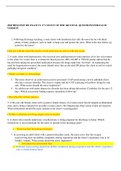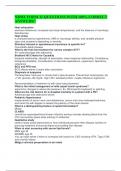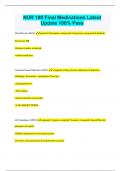Exam (elaborations)
ATI PEDS PROCTORED EXAM 2019 REVISION GUIDE
ATI PEDS PROCTORED EXAM 2019 REVISION GUIDE ATI PEDS PROCTORED EXAM 2019 REVISION GUIDE 1. A nurse is assessing language development in all the infants presenting at the doctor's office for well-child visits. At which age range would the nurse expect a child to verbalize the words "dada" and "mama"...
[Show more]





